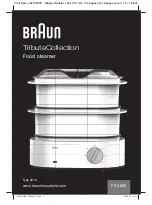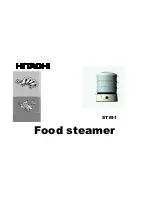
18
EN
Turn off the water and then, turn the positioning mark
of the operating valve
(A)
until it stops at
.
• You can open the pressure cooker
- fig. 1 - 2
.
This method is used for soups, rice, pasta, cake and pud-
ding mixes, recipes containing rice or pasta and recipes
with a high liquid content.
If in doubt about which method of pressure release is cor-
rect, use the fast pressure release method.
•
When cooking frothy or starchy foods,
do not release the
pressure by turning the operating valve
(A)
. Instead lift the
pressure cooker away from the heat source, leave the ope-
rating valve
(A)
in the cooking position and let the cooker
cool slowly at room temperature (takes about 15 minutes)
until the pressure indicator drops down. Reduce the recom-
mended cooking time a little.
• You can open the pressure cooker
- fig. 1 - 2.
Cleaning and maintenance
Cleaning the pressure cooker
To ensure the correct operation of your pressure
cooker, follow these cleaning and maintenance
recommendations after each use.
• Wash the pressure cooker (pan and lid) after
each use using warm water with washing-up
liquid in it. Follow the same procedure for the
basket*.
• Never use bleach or products containing chlorine.
• Do not overheat your pan when empty.
To clean the inside of the pan:
• Wash with a sponge pad and washing-up liquid.
• If the interior of the steel pan has an iridescent
sheen, clean it using white vinegar or a special
stainless steel cleaning product.
To clean the outside of the pan:
• Wash using a sponge and washing-up liquid.
Clean it with a special stainless steel cleaning
product.
Regularly check that
the pan handles are
attached properly.
Tighten them again
if necessary.
The browning and
marks which may
appear following
long term use do not
affect the operation
of the pressure
cooker.
For a longer
pressure cooker life,
do not overheat
your pressure
cooker pan when it
is empty.
















































